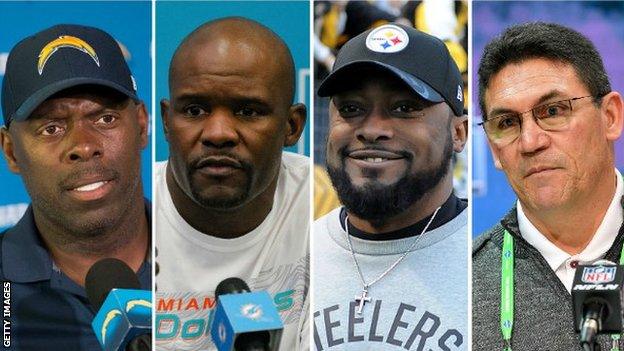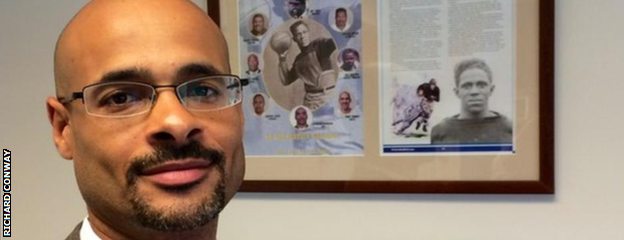Rooney Rule: Does scheme to increase BAME coaching representation actually work?
- Published
Raheem Sterling: 'We have no representation in the hierarchy'
England forward Raheem Sterling said last month that black footballers feel they "have no representation in the hierarchy".
Speaking in the context of the Black Lives Matter movement against racial inequality, Sterling said now was the "time to implement change" in English football.
The 'Rooney Rule' is often mooted as a possible solution - but does it work?
Introduced by the NFL in 2003, the rule states clubs must interview at least one black, Asian or minority ethnic (BAME) candidate for each head coach and general manager vacancy.
The Football Association (in 2018) and English Football League (2019) have adopted versions of the rule. Four of the 39 EFL appointments since have been BAME managers. After Sol Campbell left Southend, there are five across 91 clubs in the EFL and Premier League.
The Premier League has not brought in the Rooney Rule. And neither the FA nor EFL have released data on adherence to the rule. But what can be learned from the US?
Sharp decline after Raiders aren't punished
The NFL sent a clear message shortly after the Rooney Rule was introduced. The Detroit Lions appointed their new head coach without interviewing a BAME candidate and their president - not the organisation - was fined $200,000., external
That helped ensure the rule was initially a success in the NFL, which has about 70% BAME players across 32 teams. There were three BAME head coaches at the start of the 2003 season, and eight by 2011.
But after 2017 there was a sharp decline. By 2019, the number had dropped to four. At the same time, BAME general managers were cut from six to two.

The NFL has four BAME head coaches - Anthony Lynn, Brian Flores, Mike Tomlin and Ron Rivera - one more than when the Rooney Rule was introduced in 2003
A big factor was the appointment by the Oakland Raiders - now the Las Vegas Raiders - of Jon Gruden in 2018. Owner Mark Davis admitted Gruden had agreed to become head coach before his predecessor was sacked.
The Raiders later interviewed two BAME candidates so the NFL concluded the rule was not violated, external but the Fritz Pollard Alliance (FPA),, external an advocacy group whose work resulted in the Rooney Rule, felt the interviews were not 'meaningful', as required.
Professor N Jeremi Duru, who serves as counsel to the FPA, told BBC Sport: "I think that gave clubs the idea that, 'OK, they're not that serious about it any more'. I don't think it's any coincidence that in the two years since, the numbers have gone precipitously downward."
What does the data say?
Between the 2009 and 2018 seasons, data shows, external BAME coaches had to wait longer for a head coach job and, after being sacked, were less likely to get another chance.
And 17 years after the Rooney Rule came into effect, BAME numbers across the NFL are virtually the same as in 2003., external
Number of BAME people in the NFL | Start of 2003 season | Start of 2019 season |
|---|---|---|
Players | 70.9% | 70.1% |
Starting quarterbacks | 21.9% | 31.3% |
Assistant coaches | 33% | 33.6% |
Head coaches | 9.4% | 12.5% |
General managers | 6.3% | 6.3% |
The number of starting quarterbacks has risen, but today's pipeline of BAME coaches is still affected by a process called 'racial stacking', external after the NFL banned BAME people from 1934-1946.
When BAME players returned, they were steered away from 'thinking' positions such as quarterback towards 'athletic' positions. Consequently, today's offensive coaching ranks are dominated by white coaches. Between 2009 and 2018, 91% of those hired as offensive coordinators were white, and more head coaches were appointed from offensive coordinator jobs than any other position - nearly 40%.
Last season there were two BAME offensive coordinators. One of them, Eric Bieniemy, won the Super Bowl with the Kansas City Chiefs - but he continues to be overlooked for head coach roles. The New York Giants and the Carolina Panthers this year appointed white coaches with far less NFL experience.
Professor Duru said: "The Panthers owner talked about how much he saw himself in the new coach, external Matt Rhule - 'the guy reminds me of me'.
"What does this mean exactly? Is it your height, is it the way you think, or is it something more? You see that sort of thing all the time."
How unconscious bias leads to 'private networks'
Professor Duru is talking about implicit or unconscious bias., external It is perhaps the hardest thing to change among decision-makers.
"Studies show, external that when you have to make a quick decision, you go with what you're comfortable with, and generally owners of NFL clubs are more comfortable with white candidates," he said.

Prof Duru has worked with the Fritz Pollard Alliance since it was formed in 2003
In England, former Derby County and Birmingham City defender Michael Johnson has found the same with the EFL. He has "stopped bothering" trying to become an EFL manager after being overlooked for nine years, despite being fully qualified.
Although an EFL rule is now in place, there are no guidelines to punish non-compliance if a BAME candidate is not interviewed. Also, clubs are only required to interview a BAME candidate if they "operate a recruitment process"., external
Richard Bevan, chief executive of the League Managers' Association, told BBC Sport: "The regulation is undermined where clubs recruit informally, with recruitment influenced by private networks and personal relationships."
Earlier this year, the FPA argued - unsuccessfully - for NFL head coach interviews to be suspended for six weeks after the season ends, to slow down the recruitment process.
But it did succeed in having the Rooney Rule adjusted. NFL teams must now interview two BAME candidates for head coach roles, and one for every coordinator's job. They must also include BAME and/or female applicants for senior-level positions, including club president.
"When it comes to equal opportunity initiatives in systemically discriminatory societies, you can never take your foot off the gas," added Professor Duru.
"We have to keep thinking about ways to supplement the Rooney Rule, other means of fixing the problem. If we have that, with enforcements of the rule and those adjustments, I think we can turn the ship around."
'A massive opportunity - this is bigger than football'
While the Premier League is yet to adopt a similar rule, it - along with the EFL and players' union Professional Footballers' Association - has announced a new scheme to help BAME players move into professional coaching.
That follows the FA's introduction of BAME placements with England's age group squads, as well as a requirement that BAME candidates be interviewed for all England coaching positions.
Johnson has been with the men's under-21s since last summer, an opportunity he feels he would not have got before this initiative.
But he is now focused on becoming a sporting director, rather than a manager, so he can have a say on appointments when younger BAME coaches are ready to be considered.
"Top clubs [in England] are taking the sporting director role more seriously and I've done the work to be ready for that," said the 47-year-old.
"If I'm in a boardroom or a leadership team, I can offer a different cultural point of view. If club boards are more diverse, you'll have different aspects that you never thought about and that enables the owner to make better decisions.
"This is bigger than football. Sport has power on a political, social and educational level, so this is a massive opportunity. If we make a change then we can empower people outside football to believe they can achieve."